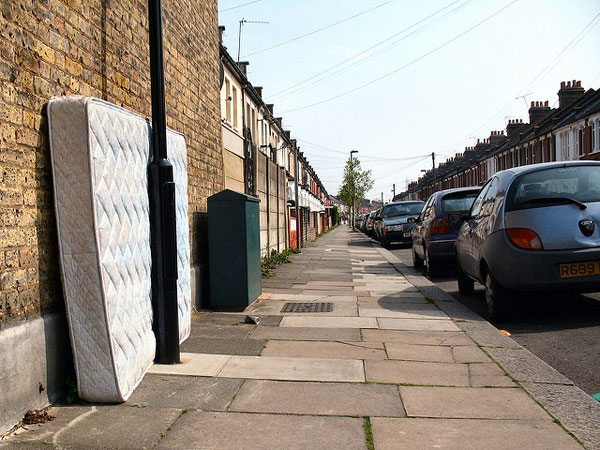
February 13, 2018; Next City
Earlier this week, NPQ reported on a social enterprise startup attached to a community mental health center. At the time, we advised caution in such endeavors, urging social services organizations with tight financial margins to carefully consider the risks of startup businesses to their parent organizations. This story shows an enterprise that has, at least on the surface, been more successful. Remember as you read this that the business model and asset base of this parent organization differs significantly from that of the one covered earlier this week.
The St. Vincent de Paul Society has always collected household donations, but what happens to those donations when they don’t lend themselves to resale?
The St. Vincent de Paul Society of Lane County in Oregon has approached its business model in a new way, hiring workers to make tiles out of molten recycled glass in their Eugene warehouse. The glass tiles are sold on site and in tourist shops around the US. In another warehouse that they own, 16 thousand pounds of books are sorted for resale or pulp.
The nonprofit brings in $21 million annually from recycling books, glass, and bedding. And in the process, they provide jobs for 385 people..
St. Vincent de Paul’s economic development director, Susan Palmer, points out the three goals of the waste management program: to “divert materials from the waste stream, create jobs for the local community, and generate revenue for the nonprofit.” The unrelated business income provides unrestricted dollars to fund such programs as their affordable housing development, homelessness and emergency housing services, and even job search activities for the unemployed.
“We’re not bound to our funders,” Palmer says. “Having our own revenue stream allows us to pivot to the needs of our community.”
The nonprofit has been sharing the recycling business model by training other nonprofits across the country for six years, started by a grant in 2012 from the Robert Wood Johnson Foundation. The Cascade Alliance, an umbrella recycling/job-training organization, was formed this way.
At St. Vincent of Lane County, says Palmer, career development is baked into its internal hiring and promoting processes.
“We don’t have a formal system, but rather a strong need for talented individuals to take on leadership roles as we grow,” she says by email. “Employees who show willingness to grow, a desire to work on our projects and be a part of our team rise up because we need them to.”
Sign up for our free newsletters
Subscribe to NPQ's newsletters to have our top stories delivered directly to your inbox.
By signing up, you agree to our privacy policy and terms of use, and to receive messages from NPQ and our partners.
The Cascade Alliance currently has 14 members. Though they receive training, they must fund their own startup operations. St. Vincent de Paul can help with small equipment costs, but the typical cost to get programs off the ground can range from $150,000 to $200,000.
One Cascade Alliance member is Greater Bridgeport Community Enterprises (GBCE), which had a prior relationship with St. Vincent. GBCE began its mattress recycling enterprise, Park City Green, in 2013 to provide jobs in a depressed region. Adrienne Houël, the organization’s president and CEO, reported that in 2017, PCG recycled more than 60,000 mattresses, which were broken down into foam for carpet padding, cotton for insulation, and springs sold as scrap. GBCE also ran a construction program from 2012 through the middle of 2017.
“The issue of employment is the critical one here in Bridgeport,” Houël says. “And the focus here would be on trying to make sure that the unemployed, disadvantaged residents of the city would be able to have jobs, which has a very big economic [impact] for the communities and for their families.”
According to the Census data, Bridgeport’s median household income in the four years between 2012 and 2016 was $42,113 and the unemployment rate was two percent higher than the US rate in September. Statewide, Connecticut’s median household income was $73,433.
Houël says one of the biggest challenges of starting Park City Green was money.
“It’s always a struggle to put together the kind of pool of resources that you need to be able to do real social ventures,” she says. “The biggest foundations do have some funds that would come in but they’re not going to come in until you really get off the ground and have your proof of concept together.”
“One of our goals is to encourage employment stability which is one of the major barriers of the populations we work with,” she notes.
Recycling nonprofits across the country use a combination of paid staff and volunteers. From Alabama to Wyoming, there are jobs in the recycling process, from Massachusetts’s Earthworm, which works with small businesses and began in 1975, to Big Reuse Brooklyn, which was granted a 501c3 in 2016 and recycles building materials in New York City. The Recycling Partnership, a national organization like St. Vincent de Paul, works with large companies to make recycling efficient and effective, providing receptacles and carts, as well as education and jobs.
Recycling and unrelated business income, social services, and employment—a match made amid the mess of our way of life.—Marian Conway











